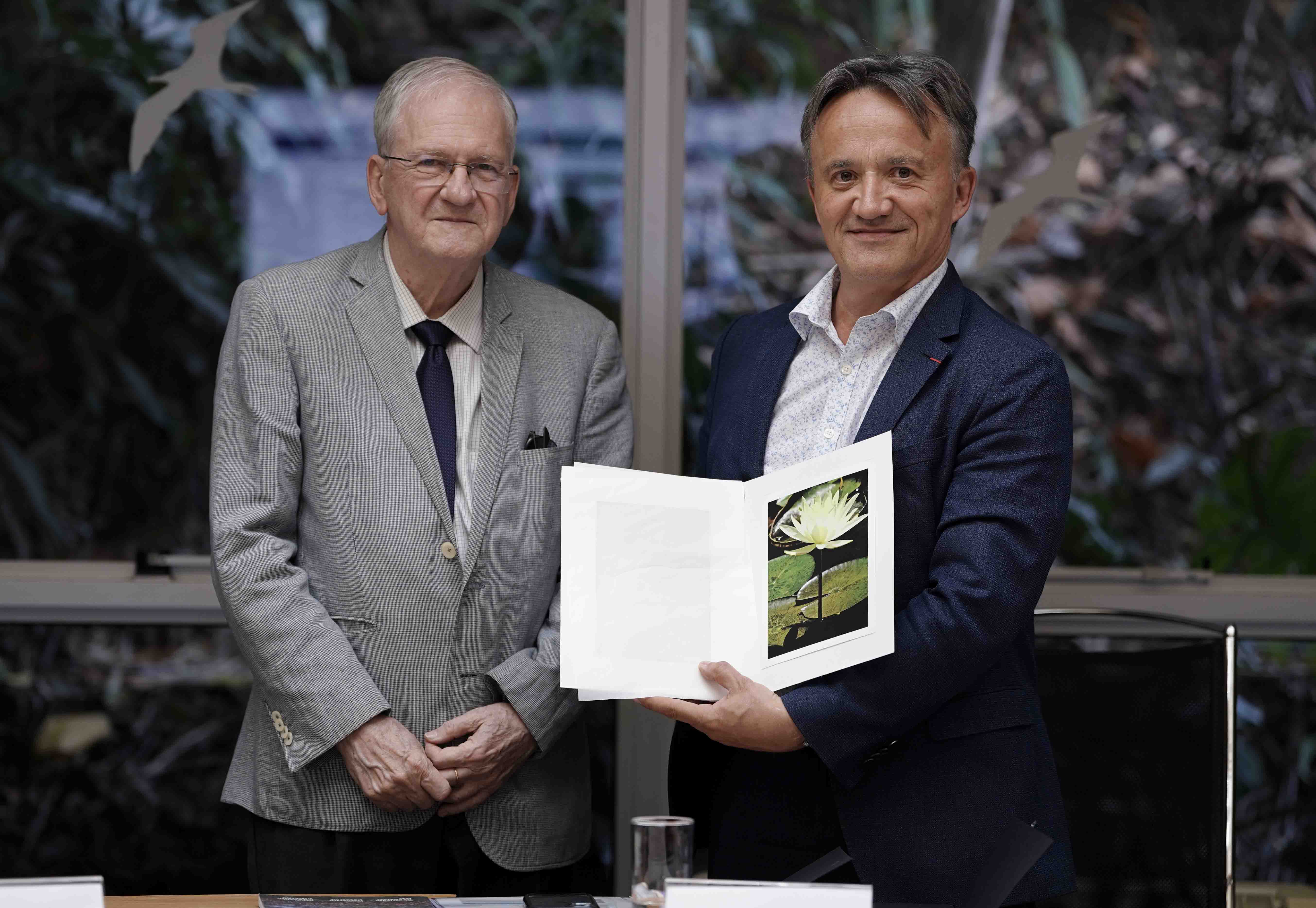

Marco Antonio Zago (left) and Philippe Mauguin in a meeting held on May 14 (photo: Daniel Antônio/Agência FAPESP)
A delegation from INRAE visited FAPESP to discuss common areas of interest in scientific collaboration.
A delegation from INRAE visited FAPESP to discuss common areas of interest in scientific collaboration.

Marco Antonio Zago (left) and Philippe Mauguin in a meeting held on May 14 (photo: Daniel Antônio/Agência FAPESP)
By Elton Alisson | Agência FAPESP – Representatives of FAPESP welcomed a delegation from France’s National Institute of Research on Agriculture, Food and the Environment (INRAE) on May 13. The aim of the meeting was to discuss common areas of interest that will be prioritized by a research collaboration agreement the two institutions plan to sign in the coming weeks.
“FAPESP is a strategic partner for INRAE in Brazil. We already have a great deal of research cooperation with good universities here, such as UNESP [São Paulo State University] and USP [the University of São Paulo], among others, and with EMBRAPA [the Brazilian Agricultural Research Corporation], in many fields including agriculture, food, microbiology and silviculture. We have the conditions to increase the partnership and conduct more joint research programs with FAPESP in areas such as the Amazon, digital agriculture and fermentation,” INRAE CEO Philippe Mauguin told Agência FAPESP.
Established on January 1, 2020, by the merger of INRA, the French National Institute for Agricultural Research, and IRSTEA, the French National Research Institute of Science and Technology for the Environment and Agriculture, INRAE has 18 research centers and is present in all regions of France.
Its researchers produce scientific articles in collaboration with scientists based in more than 150 other countries. Brazil ranks sixth among non-EU countries with the most co-publications with INRAE, according to Jean-François Soussana, its VP for International Affairs.
“Between 2017 and 2022, the number of scientific articles published by INRAE researchers in partnership with Brazil rose more than 42%. They’re co-publications of high quality. The main collaborative articles published are among the 1% most cited worldwide,” Soussana said.
The leading Brazilian institutions in terms of numbers of scientific articles published in partnership with INRAE’s researchers in the period 2017-22 were USP, which ranked no. 1, followed by EMBRAPA, the State University of Campinas (UNICAMP) and UNESP.
São Paulo state’s universities and research institutions were responsible for almost half the articles published by researchers in Brazil in collaboration with INRAE, said Marco Antonio Zago, President of FAPESP.
“São Paulo state is the leading fruit producer in Brazil and one of the world’s leading producers of orange juice, as well as sugarcane for ethanol production. It also has the most important research institutions and schools of agriculture in the country, such as ESALQ [USP’s Luiz de Queiroz College of Agriculture], in Piracicaba, and IAC [the Agronomic Institute], in Campinas. In sum, there are many opportunities to increase our cooperation with INRAE,” Zago said.
The meeting was also attended by Fernando Menezes, FAPESP’s Chief Administrative Officer; Concepta McManus Pimentel, its Manager of Research Collaboration; and Alexandre Roccatto, its Head of Scientific Programs.
The INRAE delegation also included Gabriela Sonohat-Sinoquet, Head of Cooperation Instruments; Ariane Lelah, Head of European and International Communication; and Nadège Mézié, Science and Technology Attaché at the French Consulate in São Paulo.
Republish
The Agency FAPESP licenses news via Creative Commons (CC-BY-NC-ND) so that they can be republished free of charge and in a simple way by other digital or printed vehicles. Agência FAPESP must be credited as the source of the content being republished and the name of the reporter (if any) must be attributed. Using the HMTL button below allows compliance with these rules, detailed in Digital Republishing Policy FAPESP.





